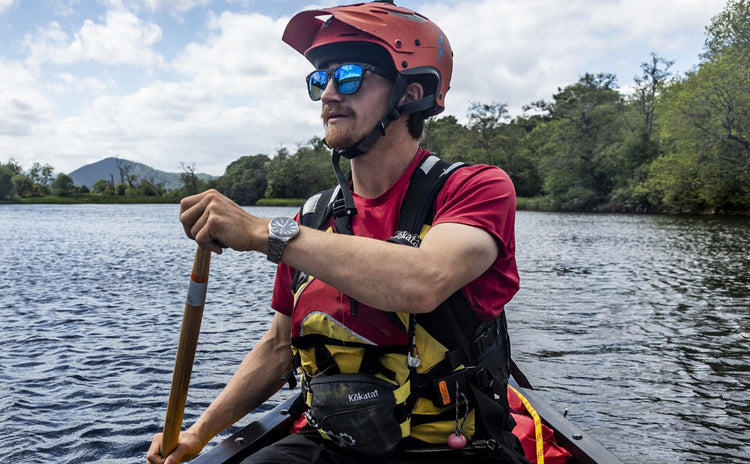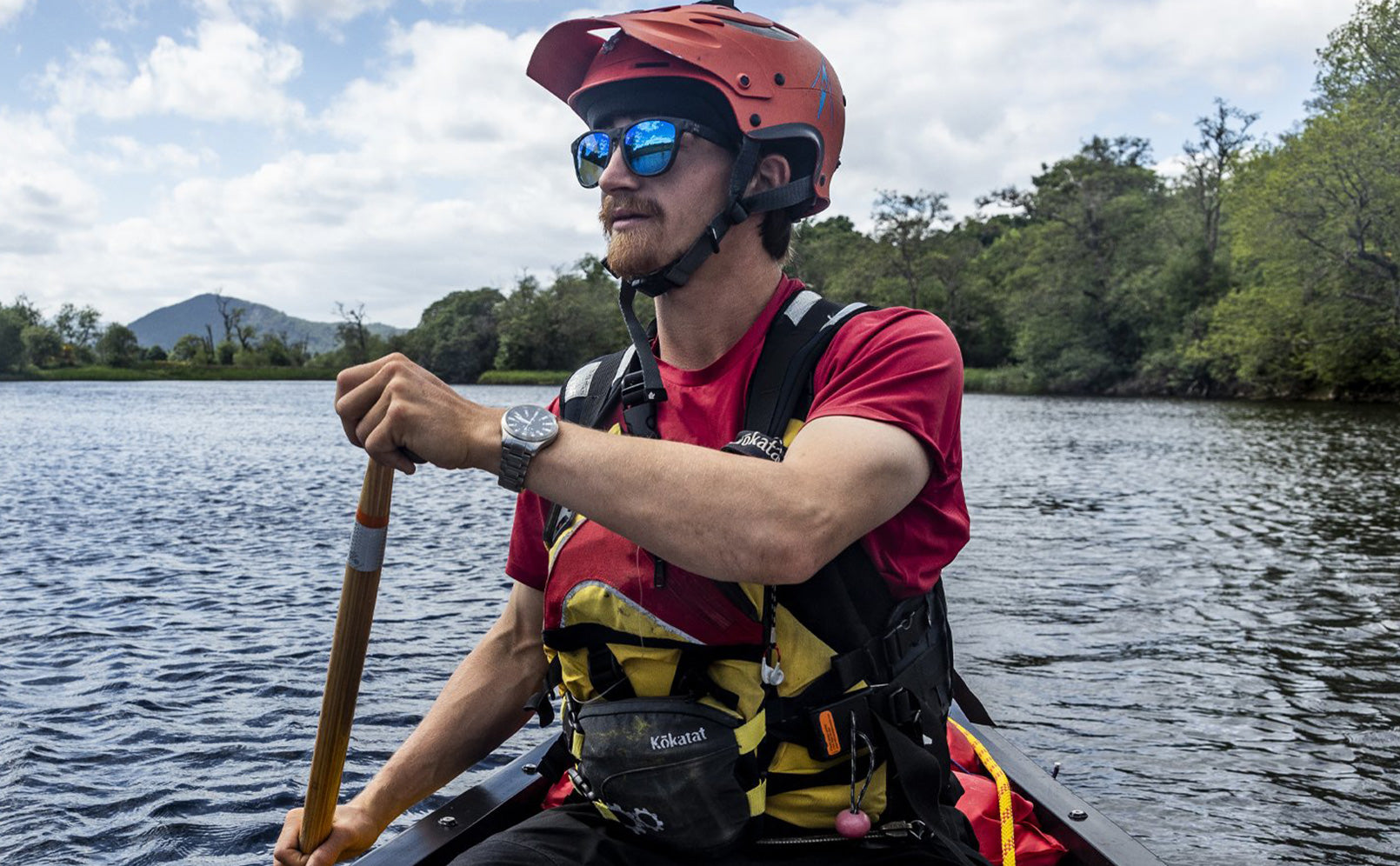Back by popular demand! Recently we introduced you to Will Copestake and have now invited him back to discuss an all things kayaking, an activity well rooted in his life and the source of many adventures.
With the sun making more appearances and summer just round the corner for us here in the UK, we can’t think of a better time to throw ourselves into a new activity that’s going to get us outside and our blood pumping.
Will co-owns his own business, Kayak Summer Isles with a great friend in Scotland offering kayak adventures for all abilities in the most remote yet incredible location. This allows them to proudly show off the stunningly rugged coast and lochs of North West Scotland.
In addition, Will has made the most of his idyllic home, making sure to never to take it for granted. From kayaking around the coast and climbing all the Munro and Corbett mountains, It’s fair to say Will might know Scotland like few others do. This makes him the BEST person to guide us through the world of kayaking. Will shares words of wisdom on how to get started in kayaking as well as added tips for those of you who already have some experience under your belt.
Here’s all you need to know on the subject from the person best equipped for the job. It’s now time to head to the person who really knows his stuff. Will, we’re handing over to you.

So, why should we all be kayaking, what are the benefits? Why can’t you live without it?
Kayaking is both a physically and mentally stimulating adventurous experience. One of the greatest aspects of sea kayaking, in my opinion, is its universality. As a largely technique driven sport it is open to a broad spectrum of ages, sexes and abilities, truly a sport for all.
I find personally, aside from the physical benefits of paddling, that a day on the water really regenerates my mental health. There is something about being in/on the water that re-sets life to a more primitive rhythm, your troubles washed away with each wave that laps the bow.
Recommended equipment
At the absolute bare minimum a paddler will need, a kayak, a paddle and a buoyancy aid. The rest is entirely condition dependent. Here in the UK a waterproof cag (jacket) and wetsuit/dry trousers are just as essential. As paddlers we must dress for immersion just in case of an unscheduled swimming endeavour. In anything other than flat/inland waters a spray skirt is also an essential to keep water from entering the cockpit. Means to communicate are also essential, be it a phone (charged and in a waterproof case), PLB (personal locator beacon), VHF Radio, flares or mirror/whistle, this can and does save lives. If going solo, spare paddles and a pump are also a good key addition.
As always, the seven p’s of preparation will aid a successful, incident free day.
"Proper Prior Planning Promotes Proper Paddling Performance."
Tell others where you are going and when you are coming back, if you don’t have anyone to tell then call the coastguard (non emergency number) and they’ll always be delighted to act as your eyes and ears off the water.
Purchasing basic paddling kit can be a big investment. Second hand markets are good for beginners but be aware of the quality and safety of the kit you buy. If only on occasional use, various companies offer rentals and many companies offer guided excursions too. Remember when purchasing a kayak to factor in the storage space they take up at home too.

Fitness levels
Kayaking lends itself to all abilities. Fitness for sure helps, but good technique is more important, both combined make a strong paddler. It is best to walk before running, start out in a safe, enclosed environment where chances of blowing offshore or big swell/surf are removed. Inland lakes/lochs, onshore wind on sheltered bays and pools are good starting points. As skill progresses so too will the environments you can go to safely. There are many providers around the country that offer training and expertise to develop your skills as a long term paddler, ultimately providing self-autonomy to explore your own adventure safely and skilfully. Alternatively join one of the many paddling clubs around the country, which is where a majority of kayakers learn their first paddling skills.
Location and Conditions
This really depends on what you want to explore. If you are a beginner then a good location is a safe location. Choose a stretch of coast without commitment i.e easy landings and safe onshore wind. Sheltered inland lochs or sheltered bays are a good place to learn and develop first abilities.
As an expert you may seek moderate or rough water, but the same principles to a beginner will still apply. Think to yourself:
- What is the weather forecast?
- Where will I end up if i come out or drift out?
- What help/self help can I use in an emergency?
I personally use multiple forecasts before embarking on a trip. This includes the Met Office (British model), XC weather (American model) and YR.no (Norwegian model). Factoring in tidal flow comes from nautical admiralty charts and almanacs as well as the Pesda Press kayaking guides.

How can we stay safe when kayaking?
The greatest tools in safety are Planning, Communication, Time and Honesty.
Planning: Before setting foot on the water you should know your route, your emergency action plans, your group ability and the forecast / tidal conditions you might expect. You want to research where your landings are, what kit you have, what limitations you might expect and how you can deal with or overcome them if things go wrong.
Communication: Before heading out it is essential to communicate to someone where and what you are doing, when you will be back and how many of you are in a party. This can be a friend, loved one or the coastguard; pick a reliable and trusted person who will remember to look out for you.
Time: There is an adage on the sea that if there is any doubt, there is no doubt and if in doubt sit it out. The sea is eternal, so if you aren’t comfortable with the conditions or forecast then wait for another day.
Honesty: Be self-reflective and honest on your skill level. Over ambition seldomly works well with the sea, which prefers to forgive the humble and timid. As with time, if you have a doubt on whether you should go out, then don’t.
The best way to stay safe on the water is to be in a buoyancy aid. Carrying essential rescue equipment within arms reach will also help immensely, this might include radios/flares/warm layers/ whistles and even sun-cream (skin cancer probably kills more kayakers than anything else). Additionally, wear colourful kit to be easily seen.
Expert tips – If we want to be on top of our kayaking game, what tips do you have for us?
My top tip for developing yourself as a paddler from beginner to expert is to be self-reflective. Every time you enter a kayak you learn something, at all levels and abilities. By taking the time, whether on the water or afterward, to de-brief yourself on what you found worked well, what didn’t and how you can improve for next time will ultimately develop you into a fantastic paddler and person. I tend to avoid giving technical paddling tips as every paddler is different and we may approach from different angles and techniques to achieve the same outcome.
In a more technical point of kit and packing, I’d recommend practicing storing and stashing everything you might need for the day within arms reach of the cockpit. This way you have it all at the tip of your fingers whether on sea or on land.
Finally, what is the first step we should take to get into kayaking?
The first step in paddling is to enjoy yourself. This could be a day out with friends in a rental, a structured session in a paddling club or a paid for excursion with a guide. If you decide from here the sport is for you, then it may be time to seek structured coaching and development.

Now Will has given us the down low on all things kayaking there really is nothing stopping you from diving in! We hope your questions have been answered and your fire for discovery is now burning that bit brighter.
We need to give Will a huge thank you for his help and advice. We can’t think of any better way to get started in the world of kayaking than through a guided kayaking experience in the remote area of Scotland. If you have more questions for Will and are intrigued by his kayaking adventures you can get in touch by emailing him here:will@kayaksummerisles.com OR alternatively send him a DM on Instagram where he would be thrilled to speak with you.
We hope you all give this water sport a try and make sure to tag us in all your photos along the way.












